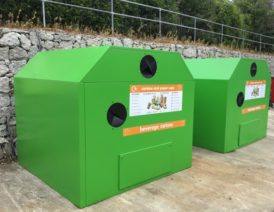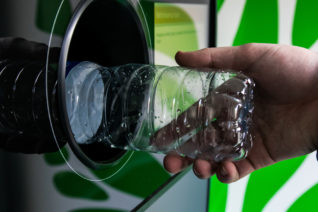A number of industry experts have questioned the future of recycling banks as more councils begin to remove them.
Improved kerbside collections, future legislation changes, fly-tipping and the economics of operating them has seen many recycling banks disappear from towns and cities across the UK.
Last week, Cornwall council became the latest to begin the removal of banks, announcing that it will be removing all of them from across 65 sites by the end of September 2020.
A statement from Cornwall council said the banks were put in place “before we introduced our household recycling collections” and are therefore redundant as kerbside collections are now widespread.
Kerbside
Cornwall joins a number of councils to have introduced such measures recently, leading to questions over their future.
Doncaster council removed recycling banks in July of last year, “due to the successful expansion of the kerbside recycling collections”, while Powys and North East Lincolnshire have issued several warnings surrounding fly-tipping at recycling banks which may result in their removal.
The Isle of Wight also made the move to remove 29 bottle banks around the island, following the introduction of the household green recycling bins in 2018.
And, their future could further be in doubt when consistent collection regulations come in, as most materials accepted at banks will be collected at the kerbside.
Despite this, there is optimism that banks will still be a feature in towns and cities in the future, but their roles could be changed to collect difficult to recycle items such as film instead.
Use
Peter Jones, principle consultant at Eunomia, said the main question surrounding operational recycling banks is “what they are being used for”, adding that they only make sense where there are gaps in what is collected kerbside.
“Historically, bring banks were the principle means in which recycling took place. Some have been retained even where services had improved. The underlying story here and reason for the closure of bring banks, is that they make less and less sense as kerbside collections improve.
“Cornwall, as the example that’s prompted this, have added a great deal of what can be collected at the kerbside over the course of the past few years.
“There are still a few authorities that don’t collect glass at the kerbside, while that remains the case, they’ll remain to have glass banks. You’ve also got the consistency proposals coming from central government which will require those who don’t collect glass, to start doing so from the kerbside. And that would lead to a review of bring bank provision in the areas.
“Because of the financial pressure local authorities are under, they have to take out under performing bits of the recycling system.”
Deposit return scheme
John Coates, head of waste at Lincolnshire county council, explained that recycling banks will come “under pressure” as alternative outlets for recycling become available to residents, such as the deposit return scheme (DRS).
Mr Coates, who is also treasurer and policy officer at Larac, said: “I think that future Government policy changes will see the provision of recycling banks come under pressure as DRS provides an alternative outlet for residents to dispose of some recyclable materials.
“But what about those items that aren’t covered by DRS? They remain totally recyclable even though not financially valuable to the resident. Market conditions are already challenging the underpinning economics of glass and textile banks.
“The issues of contamination and fly tipping require a high level of support and frequent servicing which may be put under pressure as local government budgets are squeezed to pay for the Coronavirus pandemic. But they remain highly valued by residents so maybe we need to find a way of giving them the opportunity to recycle the full range of materials conveniently but with a social contract to not abuse or misuse them.”
Niche materials
Environmental consultants, Resource Futures, argued that while recycling banks can provide flexibility to residents, they can be difficult for councils to manage. However, there still might be a place for them in communities for certain materials.
Laura Snoulton, senior consultant at Resource Futures, said: “The plain and simple reality is that bring sites are useful, providing much-needed flexibility to local communities, but they can also be difficult and time-consuming to manage and expensive for local councils to service.
“There are all sorts of complications, such as planning for seasonal fluctuations and bank holidays, ensuring banks are emptied in a timely manner when full, arranging the sites to be cleansed and ensuring they’re regularly monitored for fly tipping.”
“The combined impact of DRS and EPR regulations on kerbside and community services could be that we see niche materials being targeted”
However, Resource Futures concluded that despite the financial pressures of recycling banks, there is still a place for them within communities for the collection of ‘niche materials’
Jenny Robinson, senior consultant at Resource Futures, said: “The combined impact of DRS and EPR regulations on kerbside and community services could be that we see niche materials being targeted through a network of collection points or bring sites. So the future may be an evolution with different recycling material banks housed within bring sites or an entirely new modern day network of recycling banks!”
Ms Robinson concluded: “We don’t anticipate their departure from our streets in the future. They still have a vital role to play in our rural communities where kerbside services aren’t viable. They also offer flexibility to communities, where irregular excess recyclables are generated and can act as a prompt to tourists and visitors to recycle, for example. So, whilst austerity may have an impact on the number of recycling banks in the short term, with future legislation looming, it’s unlikely that they will disappear altogether and it looks like there could be a lot of positive change afoot.”
The post Questions over future of recycling banks appeared first on letsrecycle.com.
Source: letsrecycle.com Waste Managment





